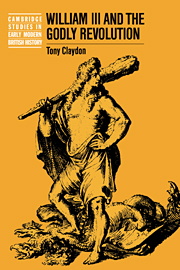Book contents
- Frontmatter
- Contents
- List of illustrations
- Acknowledgements
- List of abbreviations
- Notes on style
- Introduction
- 1 Courtly reformation and the revolution of 1688–1689
- 2 The resources for royal propaganda
- 3 The propagation of courtly reformation
- 4 Courtly reformation, the war, and the English nation
- 5 Courtly reformation and the politics of party
- 6 Courtly reformation and country politics
- Conclusion
- Bibliography
- Index
- Cambridge Studies in Early Modern British History
Conclusion
Published online by Cambridge University Press: 09 October 2009
- Frontmatter
- Contents
- List of illustrations
- Acknowledgements
- List of abbreviations
- Notes on style
- Introduction
- 1 Courtly reformation and the revolution of 1688–1689
- 2 The resources for royal propaganda
- 3 The propagation of courtly reformation
- 4 Courtly reformation, the war, and the English nation
- 5 Courtly reformation and the politics of party
- 6 Courtly reformation and country politics
- Conclusion
- Bibliography
- Index
- Cambridge Studies in Early Modern British History
Summary
On 11 March 1702, only ten weeks after William had addressed parliament for the last time, Queen Anne delivered her first speech to the legislature. As a royal propagandist, the new ruler enjoyed substantial advantages over her predecessor. She was a direct heir of James II, had been brought up in England, and had been a lifelong member of the anglican church. She therefore possessed all the traditional qualifications for English monarchy which her brother-in-law had lacked. At Westminster she made the most of her assets. In one passage of her speech, Anne tacitly alluded to the difference between her own nationality and that of William, and so hinted that court polemic might now be organised around new themes. She stated
as I know My own Heart to be entirely English, I can very sincerely assure you, there is not any Thing you can expect, or desire of Me, which I shall not be ready to do for the Happiness and Prosperity of England.
Yet, although some of the old king's closest supporters were shocked by these words, it soon became clear that Anne would not introduce a novel court ideology. The very address which appeared to reflect upon William's foreignness also expressed deep regret at his demise, and promised no change in his policy of opposition to France. In the years which followed, the incoming regime adopted the central tenets of Williamite rhetoric and put them to similar purposes.
- Type
- Chapter
- Information
- William III and the Godly Revolution , pp. 227 - 238Publisher: Cambridge University PressPrint publication year: 1996



